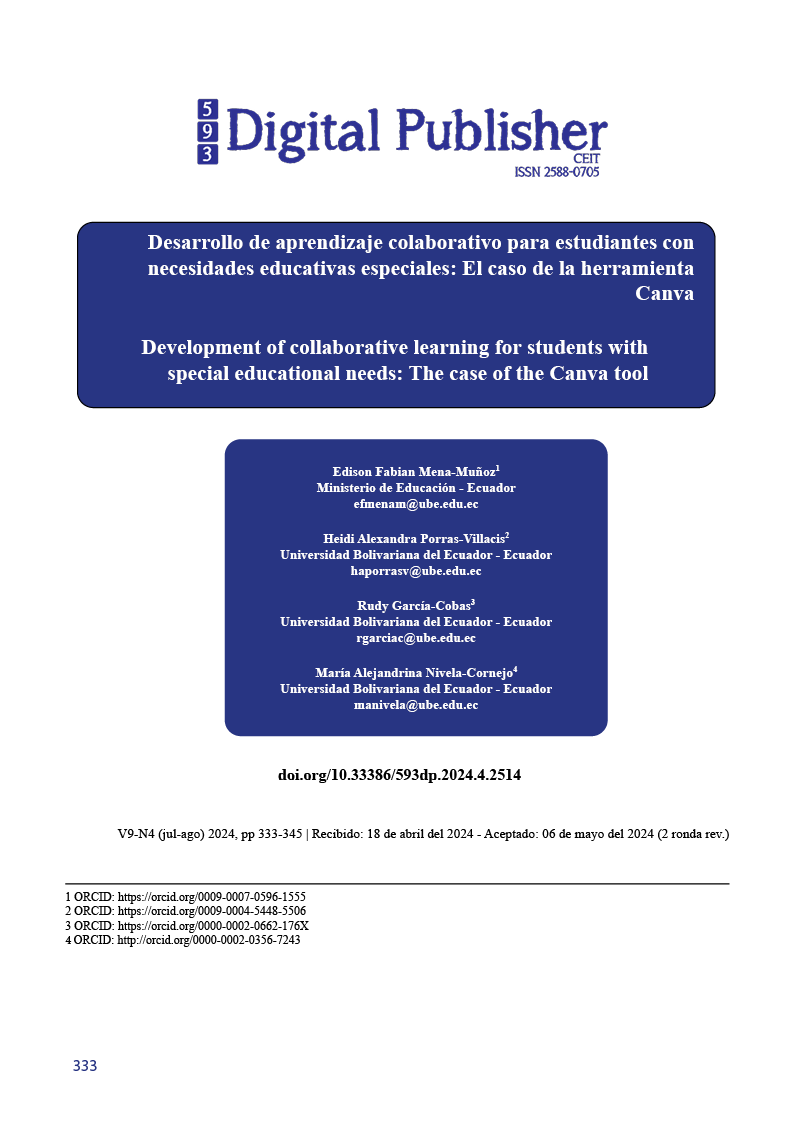Desarrollo de aprendizaje colaborativo para estudiantes con necesidades educativas especiales: El caso de la herramienta Canva
Contenido principal del artículo
Resumen
La colaboración en la educación es una metodología óptima para ofrecer una educación más inclusiva y enriquecedora, al basarse en el trabajo en equipo, fomenta las habilidades sociales, la confianza y la autoestima. La investigación se orienta al análisis del aprendizaje colaborativo para estudiantes con necesidades educativas especiales, analiza especialmente la herramienta Canva. Para efecto se empleó una metodología regida bajo en el marco sociocrítico, consistió en una investigación de campo, de carácter descriptivo y enfoque cuali cuantitativo. La técnica empleada fue la encuesta bajo tres dimensiones de estudio, además se empleó la prueba de chi cuadrado y la estadística de Cronbach. La población corresponde a 110 docentes del cantón Latacunga. Los principales resultados destacan la importancia percibida del aprendizaje colaborativo y una aceptación generalizada y positiva sobre su uso de Canva en el contexto educativo. la prueba de chi cuadrado y la estadística de Cronbach respalda la validez y fiabilidad de los ítems para medir las dimensiones evaluadas en el estudio. En conclusión, los hallazgos subrayan la necesidad de proporcionar mayores recursos tecnológicos y apoyo para los docentes en la implementación efectiva de estrategias colaborativas adaptativas, lo que podría mejorar aún más la calidad del proceso educativo inclusivo para estos estudiantes.
Descargas
Detalles del artículo

Esta obra está bajo una licencia internacional Creative Commons Atribución-NoComercial-CompartirIgual 4.0.
1. Derechos de autor
Las obras que se publican en 593 Digital Publisher CEIT están sujetas a los siguientes términos:
1.1. 593 Digital Publisher CEIT, conserva los derechos patrimoniales (copyright) de las obras publicadas, favorece y permite la reutilización de las mismas bajo la licencia Licencia Creative Commons 4.0 de Reconocimiento-NoComercial-CompartirIgual 4.0, por lo cual se pueden copiar, usar, difundir, transmitir y exponer públicamente, siempre que:
1.1.a. Se cite la autoría y fuente original de su publicación (revista, editorial, URL).
1.1.b. No se usen para fines comerciales u onerosos.
1.1.c. Se mencione la existencia y especificaciones de esta licencia de uso.
Citas
Calzada, M., Sandoval, C., & Domínguez, A. (2018). Technological tools for inclusive learning: A review of the literature. International Journal of Inclusive Education, 22(12), 1234-1256.
Flores, O., Verdú, N., Giménez, P., Juárez, J., Mur, J. A. y Menduiña, C. (2011). Web 2.0 en la docencia universitaria: Aprendizaje colaborativo a través de la tecnología. Electronic Journal of Research in Educational Psychology, 9(24), 931-960. http://ojs.ual.es/ojs/index.php/EJREP/article/view/1480
Johnson, D. W., Johnson, R. T., & Smith, K. A. (2020). Cooperative learning: Improving college instruction by using small groups. John Wiley & Sons.
Johnson, D. W., & Johnson, R. T. (2021). Cooperation and the use of technology. In D. H. Johanssen (Ed.), Handbook of research on educational communications and technology (2nd ed., pp. 785-811). Mahwah, NJ: Lawrence Erlbaum Associates.
Loa, J. A., López, M. A., & Sánchez, M. Y. (2020). Análisis del aprendizaje colaborativo mediante la herramienta Canva como medio fortalecedor del aprendizaje de los estudiantes con necesidades educativas especiales. Revista de Educación y Pedagogía, 25(2), 345-362.
Lugo, M. T., Bedoya Rodríguez, R. F., Bercovich, N., Brechner, M., Cobo, C., Gvirtz, S., … & Zúñiga Céspedes, M. (2017). Entornos digitales y políticas educativas: dilemas y certezas [Digital environments and educational policies: dilemmas and certainties]. Octaedro, Barcelona, Spain.
Muñoz, J. C. C., & Briones, M. F. B. (2020). El aprendizaje cooperativo como estrategia educativa para estudiantes con discapacidades en el bachillerato. Polo del Conocimiento: Revista científico-profesional, 5(12), 616-636.
Navarrete, G., Mendieta, R. (2018). Las TIC y la educación ecuatoriana en tiempos de Internet. Espirales - Revistas Multidisciplinarias de Investigación, 2(15), 126. https://www.revistaespirales.com/index.php/es/article/view/220/165
Nikar, Aguirre; Ruiz, M. (2021). Plataformas virtuales en el proceso de enseñanza-aprendizaje para el desarrollo del pensamiento crítico y creativo. Revista Ciencia y Sociedad, 46(1), 128-146.
Pastor, R. (2017). Ventajas del uso de la tecnología en el aprendizaje colaborativo. Revista Iberoamericana de Educación, 41(4), 5.
Pérez, A., & Salas, B. (2019). La plataforma de gestión del aprendizaje (LMS): Una herramienta tecnológica para la gestión integral de los procesos de enseñanza-aprendizaje [The learning management platform (LMS): A technological tool for the comprehensive management of teaching-learning processes]. Editorial Santillana, Madrid, Spain.
Quispe Pacheco, N. (2022). Herramientas digitales y aprendizaje colaborativo en los participantes de un Cetpro de Cangallo. Ayacucho, Perú: Editorial del autor.
Ruiz-Loor, L. G., & Intriago-Romero, W. I. (2022). El uso de la herramienta tecnológica Canva como estrategia en la enseñanza creativa de los docentes de la Escuela Fiscal Lorenzo Luzuriaga. Revista Científica Multidisciplinaria Arbitrada Yachasun - ISSN: 2697-3456, 6(11), 75-90.
Sánchez, M. (2020). Herramienta Canva para mejorar la creatividad en estudiantes de primer año en informática en la I. E. Simón Bolívar. RIDE: Revista de Recursos Investigativos en Educación, 7(2), 1-12.
Sanz, O. (2017). Óscar Sanz_ La tecnología es una herramienta para potenciar creatividad. https://www.educaciontrespuntocero.com/entrevistas/tecnologia-herramienta-potenciar-creatividad-estudiantes/
Silva, M. E. (2020). Características de las herramientas multimedia para el desarrollo de Presentaciones Interactivas. Journal of Science and Research: Revista Ciencia e Investigación, 5(1), 873-891. https://doi.org/10.5281/zenodo.4452944





